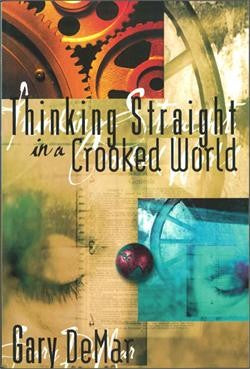Gary discusses the Christian worldview, how we got where we are today, and how we get back to being world-changers on today’s podcast.
Christians are not told to take up arms to defend or advance the Christian faith. We are engaged in a war of ideas. The biblical image of war is designed to remind us that defending the faith is serious business (Acts 7:54-60; 12:2). We should not shy away from the war analogy since it is used by numerous groups to describe what is at stake in ideological battles:
In all of this, the language of confrontation, battle, even war, then, is not merely a literary device but an apt tool to describe the way in which the many issues contested in American public culture are being settled. It is no surprise that many of the contenders on all sides of the cultural divide use the very same language to understand their own involvement. The national Organization for Women, for example, has a “War Room” in its national headquarters in Washington, D.C., a windowless room with charts, maps, a conference table, and a dozen or so telephones. Both sides of the new cultural divide could agree with the editor of Publisher’s Weekly who declared that the controversy over the arts and publishing was a “war”—“a war that must be won.” So, too, activists on both sides of the cultural divide could agree with James Dobson of Focus on the Family, who announced, “We are in a civil war of values and the prize to the victor is the next generation—our children and grandchildren.” Another activist observed that this “is a war of ideology, it’s a war of ideas, it’s a war about our way of life. And it has to be fought with the same intensity, I think, and dedication as you would fight a shooting war.” [1]
While the Christian’s weapons “are not of the flesh” (2 Cor. 10:4), the Bible uses battle weapons in a symbolic way to characterize the reality of spiritual warfare: armor, shield, breastplate, helmet, and sword (Eph. 6:10–17). The Bible shows Jesus at His coming with “a sharp sword” coming from His mouth “so that with it He might smite the nations” (Rev. 19:15). In addition, God’s Word is described as “sharper than any two-edged sword, piercing as far as the division of soul and spirit, of both joints and marrow, and able to judge the thoughts and intentions of the heart” (Heb. 4:12).
The best way to handle attacks by skeptics is to have worked out an apologetic methodology. It’s been said that the best defense is a good offense. The power to destroy all speculations raised up against the knowledge of God is inherent in God’s Word. Yet many Christians either don’t know how to use the Bible as a spiritual weapon or don’t believe that it is effective in confronting “philosophy and empty deception” based on the “tradition of men, according to the elementary principles of the world” (Col. 2:8). A cogently presented, comprehensive, and consistent Christian worldview can stand up to and answer any hostile belief system. But it takes work to understand how skeptics think, believe, and behave. Your job is not finished until you are always “ready to make a defense to every one who asks you to give a reason for the hope that is in you” (1 Peter 3:15). This is what thinking straight in a crooked world is all about.

Thinking Straight in a Crooked World
The nursery rhyme ‘There Was a Crooked Man’ is an appropriate description of how sin affects us and our world. We live in a crooked world of ideas evaluated by crooked people. Left to our crooked nature, we can never fully understand what God has planned for us and His world. God has not left us without a corrective solution. He has given us a reliable reference point in the Bible so we can identify the crookedness and straighten it.
Buy NowThe Gospel of Jesus is “a stumbling block to the Jews and foolishness to the Gentiles” (1 Corinthians 1:23). Despite being in the cultural minority, the early church “turned the world upside down” (Acts 17:6). Gary discusses the Christian worldview, how we got where we are today, and how we get back to being world-changers.
Click here for today’s episode
Click here to browse all episodes of The Gary DeMar Podcast
[1] James Davison Hunter, Culture Wars: The Struggle to Define America (New York: Basic Books, 1991), 64.

